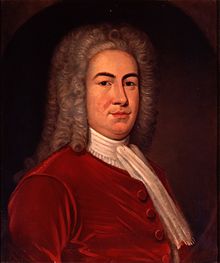William Burnet (politician, 1688)
William Burnet (born March 1688 in The Hague , Netherlands ; † September 7, 1729 in Boston , which was then part of the Province of Massachusetts Bay ) was the early 18th century English governor of various colonies in America.
Life
William Burnet was born into a privileged family. His father Gilbert Burnet (1643-1715) was from 1689 Bishop of Salisbury. Williams godfather was Wilhelm III. , Governor of the Netherlands, who was to become King of England that same year. At the age of 13, William Burnet was enrolled in Oxford University School . However, he was soon expelled from this school for disciplinary reasons. Then he enjoyed a private education. His teachers included Sir Isaac Newton . At his suggestion he later became a member of the Royal Society . After his training he was admitted to the bar. Whether he actually practiced is not known. He was more interested in science, including astronomy and mathematics. He also wrote some religious writings.
Because of his ties to the English royal court, he was appointed Comptroller of Customs at the customs administration. Burnet invested in the South Sea Company and fell victim to the so-called South Sea Bubble in 1720 . So it was convenient for him that his friend Robert Hunter , the previous colonial governor of the province of New York and New Jersey had to return to Europe. Both men exchanged positions in agreement with the government. Hunter became Comptroller of Customs and Burnet Colonial Governor of New York and New Jersey. He held both offices simultaneously between 1720 and 1728.
In New Jersey there were conflicts over budget issues between him and the colonial parliament (provincial assembly). The conflict was resolved through bribery. In exchange for paying £ 500 for his alleged expenses, Burnet signed Parliament's budget. This type of bribery later became a nearly normal practice in New Jersey between the colonial governors and the Provincial Assembly. In New York he showed himself to be a prudent steward of the colony. Even so, there was domestic opposition to him. He encouraged the colonists' direct trade with the Indians. This should weaken the influence of the French traders on them. However, differences soon developed between the governor and some influential citizens of the colony. Ultimately, his trade policy with the Indians was rejected by the colonial parliament, which has increasingly opposed him in the last few years of Burnet's tenure. As early as 1729, all trade laws that Burnet had enacted in connection with the Indian trade were revoked.
After the death of King George I in 1727, his son and successor George II decided to appoint John Montgomerie as the new colonial governor of New York and New Jersey. He had previously served as the bedchamber as a groom . As a result, William Burnet was dismissed from his previous post and appointed the new governor of the Province of Massachusetts Bay . He held this office from July 19, 1728 until his death. Since December 1728 he was also governor of New Hampshire . These two colonies were usually ruled by the same governor between 1699 and 1741. Burnet spent little time in New Hampshire. Nevertheless, he received a regular salary there as governor, which he was denied in Massachusetts by the colonial parliament there. This question dominated Burnet's entire tenure and was still unresolved at the time of his death on September 7, 1729.
Web links
- Burnet's will
- Article on Burnet and his speech on his salary in the American History from Revolution to Reconstruction and beyond
- Biography of Hunters in the Kids Net Enyclopedia
| personal data | |
|---|---|
| SURNAME | Burnet, William |
| BRIEF DESCRIPTION | British colonial governor of several colonies in America |
| DATE OF BIRTH | March 1688 |
| PLACE OF BIRTH | The Hag , Netherlands |
| DATE OF DEATH | September 7, 1729 |
| Place of death | Boston , Massachusetts |


